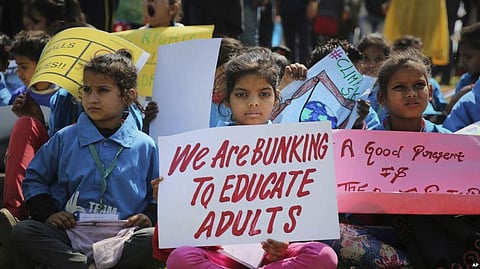
- Home
- न्यूजग्राम
- NewsGram USA
- India
- World
- Politics
- Entertainment
- Culture
- Lifestyle
- Economy
- Sports
- Sp. Coverage
- Misc.
- NewsGram Exclusive
- Jobs / Internships

They're angry at their elders, and they're not taking it sitting down.
Students worldwide are skipping class Friday to take to the streets to protest their governments' failure to take sufficient action against global warming.
The coordinated "school strikes," being held from the South Pacific to the edge of the Arctic Circle, were inspired by 16-year-old Swedish activist Greta Thunberg, who began holding solitary demonstrations outside the Swedish parliament last year.
Since then, the weekly protests have snowballed from a handful of cities to hundreds, driven by social media-savvy students and dramatic headlines about the impact of climate change.
Students attend a protest ralley of the "Friday For Future Movement" in Berlin, Germany, March 15, 2019. VOA
Thunberg, who was recently nominated for the Nobel Peace Prize, was cheered for her blunt message to leaders at the World Economic Forum in Switzerland this year, when she told them: "I want you to panic. I want you to feel the fear I feel every day."
Friday's rallies are expected to be one of the biggest international actions yet. Protests were under way or planned in cities in more than 100 countries, including Hong Kong; New Delhi; Wellington, New Zealand; and Oulo, Finland.
In Berlin some 10,000 protesters, most of them young students, gathered in a downtown square, waving signs with slogans such as "There is no planet B" and "Climate Protection Report Card: F" before a march through the capital's government quarter. The march was to end with a demonstration outside Chancellor Angela Merkel's office.
Organizer Carla Reemtsma, a 20-year-old university student, said social media had been key in reaching people directly to coordinate the massive protests in so many different locations, noting that she was in 50 WhatsApp groups and fielding some 30,000 messages a day.
"It's really important that people are getting together all over the world, because it's affecting us all," she said.
Critics, supporters
Some politicians have criticized the students, suggesting they should be spending their time in school, not on the streets.
"One can't expect children and young people to see all of the global connections, what's technically reasonable and economically possible," said the head of Germany's pro-business Free Democratic Party, Christian Lindner. "That's a matter for professionals."
